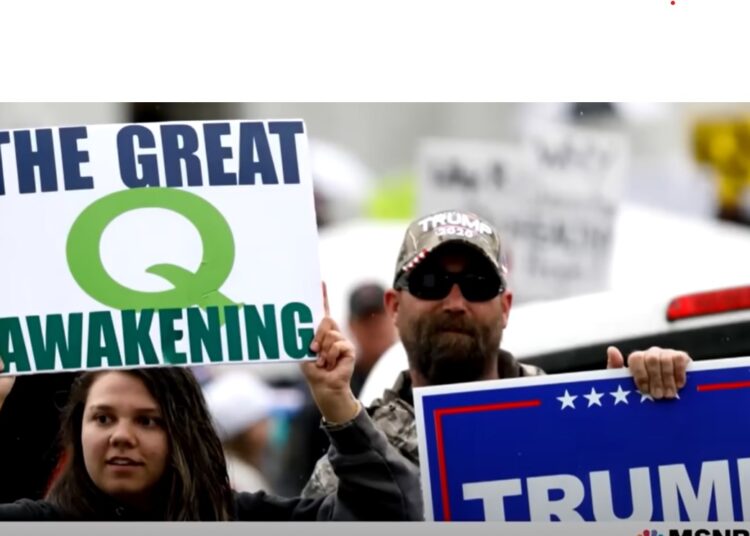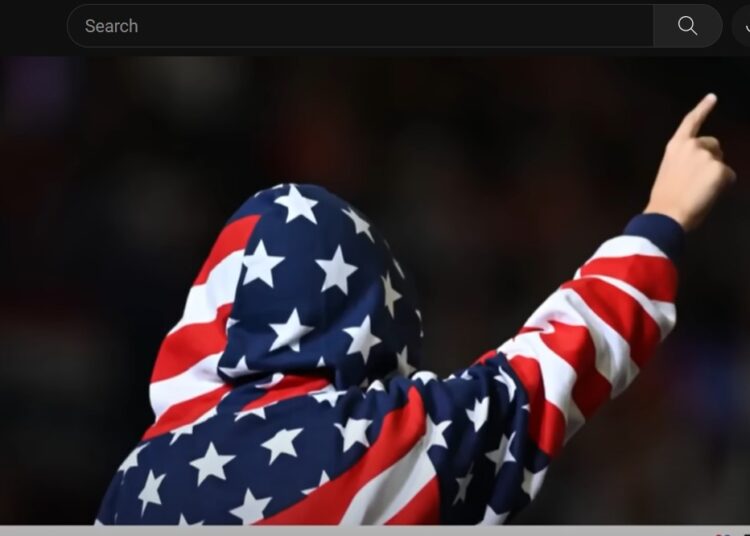According to New York Times writers Maggie Haberman and Ken Bensinger, two years after Trump was banished from most mainstream social media sites for his role in inciting the Capitol riot, his online presence has grown only more extreme — even if it is far less visible to most Americans, who never use the relatively obscure radical platforms where he has been posting at a sometimes-astonishing clip.
In September, the former president went on Truth Social, his social network, and shared an image of himself wearing a lapel pin in the form of the letter Q, along with a phrase closely associated with the QAnon conspiracy theory movement: “The storm is coming.”
Since introducing his social media website, in February 2022, Trump has shared hundreds of posts from accounts promoting QAnon ideas. He has continued to falsely insist that the 2020 election was stolen and that he is a victim of corrupt federal law enforcement agencies. And he has made personal attacks against his many perceived enemies, including private citizens. There is no sign that he has curtailed his behavior or stopped spreading the kinds of messages that got him exiled in the first place.

Now Trump’s increasingly probable return to major platforms raises the prospect that he will carry over his more radicalized behavior to a far wider audience on Facebook and Instagram, with a combined 5 billion active users, and Twitter, with 360 million active users.
The potential for such an outcome has alarmed extremism experts and prompted questions about how Trump’s assertions, long confined to a right-wing arena, are likely to play with mainstream voters.
The banishment from those mainstream social media platforms did not tame him. “In fact, he’s grown more extreme,” said Jared Holt, a researcher at the Institute for Strategic Dialogue who studies technology and extremism in the United States. “I don’t think anybody should reasonably expect him to be any different if he’s back on Facebook and Twitter. And when it comes to spreading conspiracy theories, Trump is the big tuna.”
Just last month he shocked many, even as Meta was considering whether to reinstate his accounts, by claiming that even the Constitution should not stand in the way of his return to power.
“A Massive Fraud of this type and magnitude allows for the termination of all rules, regulations, and articles, even those found in the Constitution,” he said.
Steven Cheung, a spokesperson for Trump, said Thursday that “Truth Social has been a success because President Trump has created a true free-speech platform, unlike the Big Tech oligarchs who censor conservatives.” The fact that Trump considers such dangerous statements about the Constitution, and his persistent claims of a corrupt election process to be “true free speech,” should alarm us.
Democrats have said he’s still dangerous. Last month, four of the party’s members of Congress urged Meta not to reinstate Trump, writing in a letter that he was still “undermining our democracy.”
Neverheless, on Wednesday, Nick Clegg, Meta’s president for global affairs, wrote in a blog post that “our determination is that the risk has sufficiently receded.” He added that the suspension was “an extraordinary decision taken in extraordinary circumstances” and that normally, “the public should be able to hear from a former president of the United States, and a declared candidate for that office again, on our platforms.” Conservatives praised the decision, and the American Civil Liberties Union and Sen. Bernie Sanders defended the move.
In a podcast interview in June, Kash Patel, an adviser to Trump and, at the time, a director of the company that owns Truth Social, described the proliferation of QAnon-friendly content on the site as a deliberate business decision by the platform, which has struggled financially.

“We try to incorporate it into our overall messaging scheme to capture audiences,” Patel said. “You can’t ignore that group of people that has such a strong, dominant following.”
Meta’s blandishments about instituting guardrails to curtail radical posts by Trump may have a similar motive. Rashad Robinson, the president of Color of Change, a civil rights group that pressured Facebook to enact policy changes through advertiser boycotts, stated that, “Corporations like Facebook have continued to find ways to profit off Trump even as they’ve condemned him. It’s not just that they let Donald Trump back on their platform, it’s that they benefit from it.”
Robinson pointed to what is probably the ultimate decision-making criterion for Meta as well as Truth Social: “Facebook has more followers than Christianity…There is not really a comparison point in terms of reach and advertising power.”
And simply put, despite all the self-serving rhetoric, money supersedes democracy’s wellbeing.












